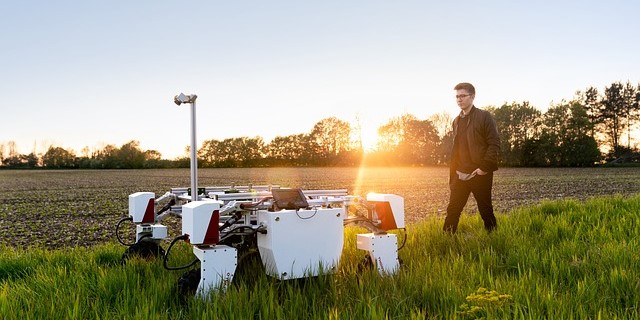Agriculture 4.0: Powering the Next Generation of Farming Innovation

How Artificial Intelligence is Transforming Food Systems for a Smarter, More Sustainable Future
Artificial Intelligence (AI) is rapidly redefining agriculture—from the roots in the soil to the systems that deliver food to global markets. The AI in Agriculture Market is projected to grow from $1.7 billion in 2023 to $4.7 billion by 2028, underpinned by advances in data analytics, machine learning, and automation.
At Strategic Allies Ltd (SAL), we work across a range of sectors, but our proximity to Rothamsted Research—one of the world’s oldest agricultural science institutes—keeps us especially connected to developments in the AgriTech space. From novel sensing platforms to predictive intelligence for crops and livestock, we track and help accelerate innovations that can drive resilient, data-powered agriculture at scale.
This article examines how AI is currently being deployed across the agricultural value chain and how multinational companies are leveraging it to improve yields, cut emissions, and address pressing labour and climate challenges.
Precision Agriculture: A Strategic Response to Rising Input Costs and Climate Pressure
At the heart of precision farming is Machine Learning (ML), which identifies patterns from vast amounts of agronomic and environmental data. AI-powered models now underpin smarter irrigation schedules, variable-rate input application, and dynamic pest management—all essential in the face of climate variability and more importantly profitability.
With input prices soaring – between 80% and 250% in recent years – farmers are under pressure to maximise yields while controlling costs. According to McKinsey, 67% of farmers cite rising input prices as a top concern, and commodity price volatility only adds to the uncertainty.
Precision-agriculture hardware adoption is highest in North America (28%), followed closely by South America (27%) and Europe (21%). Farmers report the most value from yield mapping and monitoring (69%), variable-rate fertiliser application (67%), and automatic sprayer-section shutoffs (67%)—all of which are increasingly driven by AI-enabled decision-making tools.
One company at the forefront of this shift is xFarm, a digital platform that helps over 340,000 farms in 100+ countries digitise and optimise their operations. Featured at Groundswell – attended by two members of SAL’s team this year – xFarm Technologies offers a modular precision agriculture platform that combines agronomic modelling, weather forecasting, field-specific satellite data, and IoT integration. Their tools allow farmers to:
- Monitor soil moisture and crop stress,
- Fine-tune irrigation and fertiliser inputs,
- Optimise pesticide use,
- Improve traceability and compliance
xFarm’s platform acts as a digital control centre, helping farmers cut waste, reduce risk, and adapt to market and climate volatility with confidence.
Livestock Monitoring: Health Insights in Real Time
AI’s role extends beyond crops. For livestock farming, where welfare, productivity, and disease risk are constant concerns, AI-powered tools that combine computer vision, wearable sensors, drones, and predictive analytics can deliver 24/7, real-time insights across large and dispersed herds.
These technologies allow farmers to:
- Detect early signs of illness via vital sign monitoring and video-based behavioural analysis,
- Track movement and grazing patterns using GPS and drones,
- Optimise feeding through AI-regulated smart feeders, and
- Manage reproduction and environmental conditions with AI models that predict oestrus, calving windows, and adjust housing conditions accordingly.
One practical example is Dutch company Serket, which equips pig farmers with AI video analysis tools that monitor animal behaviour continuously. Subtle deviations—such as a drop-in activity or changes in posture—trigger real-time alerts to enable early intervention and prevent health issues. Serket’s platform also supports digital recordkeeping for compliance and traceability across the value chain.
As AI models evolve, future trends point to the integration of robotics, blockchain, and AI-powered market intelligence, paving the way for fully connected, sustainable, and high-performance livestock systems.
Robotics and Automation: Tackling Labour and Input Challenges
Amid rising labour shortages and environmental regulations, automation is becoming indispensable. AI-integrated robotics can now plant, harvest, weed, and monitor crops with unprecedented precision. SAL recently worked with an established ingredients manufacturer operating large-scale organic farms to explore advanced weed control solutions. During this work, we reviewed several AI-guided technologies, including robotic and laser-based systems. You can read more in our case study: Organic Weed Control Solutions.
Carbon Robotics, a US-based agtech company, has developed the LaserWeeder G2, a cutting-edge autonomous implement that uses convolutional neural networks (CNNs) and high-resolution computer vision to identify and eliminate weeds with precision-targeted lasers. Unlike conventional methods, the LaserWeeder doesn’t rely on herbicides or tillage, meaning it protects crops while eliminating the need for chemical input in weed control—boosting both sustainability and soil health.
The system operates entirely offline, thanks to powerful onboard processing, and learns from thousands of human-labelled weed/crop image pairs. As a result, it’s able to zap only the weeds, leaving crops untouched—even in complex and changing field conditions. This is not just about automation—it’s about AI-enabled selectivity, reducing herbicide use and enabling regenerative practices at scale.
Carbon Robotics’ founder, Paul Mikesell, sees potential for future integration with generative AI, where farmers could task systems to manage entire fields autonomously through natural language commands.

AI in Action: Case Studies from Multinational Leaders
Syngenta: Accelerating trait Discovery and Crop Innovation
Challenge
Crop breeders face increasing pressure to deliver plants with better yields, nutrition, flavour, and resilience to pests and diseases. However, traditional trait discovery is slow and hypothesis-driven, often limited by the complexity of genetic regulation and the volume of data involved. To meet the demands of growers and consumers, the process must become faster, more predictive, and more scalable.
Solution
In 2024, Syngenta partnered with AI company InstaDeep to explore the use of Large Language Models (LLMs) in crop trait discovery. Their joint effort centred on AgroNT—a transformer-based LLM pre-trained on 10.5 million genomic sequences from 48 key crop species. By learning the “language” of plant DNA, AgroNT supports AI-assisted trait design, helping Syngenta’s scientists model, predict, and optimise gene sequences for improved crop performance. The initial feasibility study focused on corn and soybean, combining Syngenta’s world-class bioinformatics with InstaDeep’s advanced AI platform.
Impact
- Enabled predictive insights into DNA regulation, accelerating the trait discovery pipeline
- Supported faster, more informed decision-making by Syngenta’s R&D teams
- Marked a shift from empirical to AI-guided design of crop traits
- Laid the foundation for a second phase of collaboration to expand trait innovation across crops
- Strengthened Syngenta’s ability to deliver high-performing traits to farmers faster
PepsiCo India: Using AI to Boost Potato Yields and Resilience
Challenge
PepsiCo India, sourcing potatoes for its Lay’s brand from over 27,000 smallholder farmers, faced rising climate unpredictability, crop diseases, and pressure to optimise yields while managing input costs and maintaining consistent quality. Traditional monitoring methods couldn’t offer the real-time insights needed for timely, targeted interventions across its vast contract farming network.
Solution
Partnering with agtech firm Cropin, PepsiCo implemented a plot-level intelligence system using satellite imagery, AI/ML models, and remote sensing to monitor crop stages, forecast yields, detect water stress, and predict disease outbreaks. Delivered via interactive dashboards and mobile apps in five languages, this platform empowered field teams and farmers to act proactively and efficiently.
Impact
The AI-enabled system accurately predicted potato yield up to 45 days in advance, enabled smarter irrigation, and triggered early disease alerts—preventing crop loss and improving resource use. Based on a successful pilot across 3,000+ hectares, PepsiCo is scaling the technology nationwide, driving better profitability, sustainability, and supply chain resilience for both the company and its growers.
Cargill: Delivering Data-Led Gut Health Solutions for Poultry
Challenge
Tailoring poultry feed to optimise flock performance is complex, largely because the gut microbiome—the key to digestion, immunity, and overall health—is often a black box. Farmers lack clear visibility into how changes in feed, additives, or management practices influence the microbial ecosystem and, in turn, animal performance and food safety.
Solution
Galleon™, developed by Cargill, is an AI-driven microbiome intelligence platform that uses noninvasive sampling, microarray technology, and the world’s largest poultry microbiota database to decode gut health. Drawing on over 60,000 samples from 25 countries, Galleon identifies key bacterial biomarkers that link microbiome composition with performance outcomes. It provides science-based, practical recommendations on feed, additives, and farm practices to support better nutrition and health outcomes.
Impact
- Supported 200+ trials globally to improve FCR, ADG, and body weight
- Helped farmers reduce pathogen risks and optimise responses to ingredient changes, ventilation, biosecurity, and antibiotic reduction
- Transformed complex microbiome data into clear, actionable insights that improve poultry health, welfare, and productivity across diverse farm systems
What’s Next: Beyond the Farm Gate
The future of AI in agriculture will not be confined to fields or barns. Emerging frontiers include:
- Climate-smart crop modelling to anticipate stress events before they hit.
- AI-assisted supply chain optimisation to reduce food waste and improve transparency.
- Carbon farming verification systems, using AI to measure, report, and validate sequestration data.
As regulation tightens and sustainability reporting becomes mandatory, AI will increasingly serve as a compliance tool as much as a productivity booster.
Strategic Allies Ltd: Partnering to Accelerate Agricultural Innovation
At Strategic Allies Ltd, we help R&D, innovation, and sustainability leaders navigate this complex, fast-moving space. Our strength lies in identifying cross-sector solutions, spotting adjacent technologies, and building strategic partnerships to help global players stay ahead of disruption.
Whether you’re exploring new AI applications in crop science, seeking novel data sources, or building a future-proof agritech strategy, we’re ready to collaborate.
Contact John Allies at john@strategicallies.co.uk to discuss how we can help shape your next move.